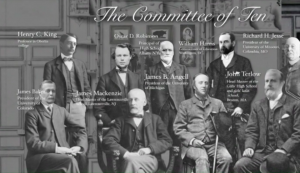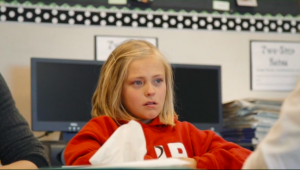- Key Scene (1:15:38-1:18:20) This scene was pivotal to the movie because it showed the growth of students from the beginning of the school year to the end. Hyde Tech High School looks to develop students to independently and cooperatively learn by engaging in the things they are most passionate about. During this scene, filmmakers isolated the camera on the student presenting in front of the board of teachers. The students passionately spoke to their growth and skills they gained over the course of the year. Their ability to recognize their educational growth speaks to the design of the high school. As our nation shifts from an “industrial economy to informational economy” (Whiteley, 2015, 1:18:41) it is imperative to shift the way education systems educate students. This is similar to the reading, “The Dirty Dozen” by Welner. There are multiple ways to approach inequalities in schooling and it is always a constant battle to create meaningful education that can provide equal educational opportunities for all students. This scene truly supports the new style of education that allows students to engage in learning in a way that facilities passion and independence for future endeavors. The filmmakers did a tremendous job of encapsulating the emotion and passion of students by showing their confidence. The filmmakers shot the scene from both close-up shots and far away shots to show how confidently students were able to speak about their growth. Overall, this scene coincides nicely with the scene from the beginning of the movie (Ibid, 2:23) because it shows the level of passion that the filmmakers daughter is currently missing. It gives purpose to the introduction of the film and provides the evidence that creative education will lead to innovation and entrepreneurial economy. These testimonials of Hyde Tech High students really show that this nation should “put in place educational environments that help kids understand that the world is an interesting place and their job is to go understand it probe it change it and poke at it, those are still skills I haven’t seen computers display” (Ibid, 1:19:15).
- The filmmakers detail the theory of change as the development of subject-based teaching that originated from the industrial revolution. The “Committee of Ten” (Ibid, 13:25) developed these subject in the 1890’s and the education system still functions with these subjects.
 However, film makers express that the present-day economy is able to create more wealth with lower employment rates which creates a large problem in the education sector because recent college graduates are unable to attain a significant job. In addition, film makers suggest the role of technology has drastically influenced the way our economy functions. However, with the new role of technology, the way we are teaching students has remained the same. The nation is still focused on teaching the most content matter as possible, the system which originated from the Committee of Ten. The education system teaches organization over actual beneficial education (Ibid, 11:15) The policy chain has also directly influenced the way our nation educates students.
However, film makers express that the present-day economy is able to create more wealth with lower employment rates which creates a large problem in the education sector because recent college graduates are unable to attain a significant job. In addition, film makers suggest the role of technology has drastically influenced the way our economy functions. However, with the new role of technology, the way we are teaching students has remained the same. The nation is still focused on teaching the most content matter as possible, the system which originated from the Committee of Ten. The education system teaches organization over actual beneficial education (Ibid, 11:15) The policy chain has also directly influenced the way our nation educates students. 
“The nation is obsessed with numbers” Policy-makers emphasize the importance of test-based performance measurements. These educational measurements look to “raise test performance by 7%” (Ibid, 42:11) rather than challenging students to develop independent, abstract learning. It is clear that this policy chain is detrimental in the eyes of film-makers because it does not coincide with preparing students for success in life and the national economy.
- Visual Evidence: (Whiteley, 2015, 2:23)

The teacher is telling her that sometimes school is hard but she needs to stick with it. The filmmaker and his daughter (pictured above) think this is unreasonable. - Source Credit
- Whitely, Greg, “Most Likely to Succeed,” Video Documentary (2015), 2:33.
- Source Citations
Welner, K. G. (April 2013). The Dirty Dozen: How Charter Schools Influence Student Enrollment. Teachers College Record. [online], http://www.tcrecord.org ID Number: 17104.
Whitely, Greg, “Most Likely to Succeed,” Video Documentary (2015)